Delete Coinbase in 3 Easy Steps!
You may have wondered “How do I get my money out of Coinbase?” This guide is focused on how to transfer Bitcoin from Coinbase, and then delete your account forever!

In light of the recent SEC actions against Coinbase, you may have wondered, “How do I get my money out of my Coinbase account?”
Today, we’ll take you through step-by-step how to move your crypto assets off Coinbase and then permanently deleting your Coinbase account in just 3 simple steps.
Let’s get into it!
Your instinct may be to convert your satoshis to dollars before withdrawing your money from Coinbase. But it’s worth considering why many consider Bitcoin the best money in human history. You don’t want to part with such a precious asset lightly.
Step 1: Sell Your Altcoins for Bitcoin
Before closing your account, convert all your altcoins into Bitcoin. This is a deep topic to explore, but suffice it to say that you are better served by holding Bitcoin than gambling on any altcoin.
To sell your altcoins for Bitcoin, click 'Trade' at the top right of any Coinbase page.
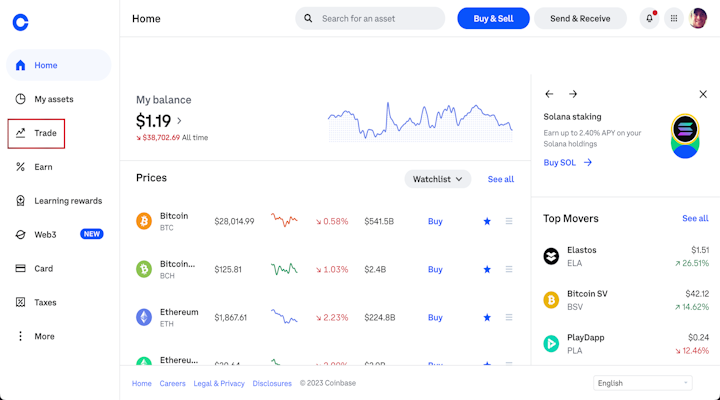
Then select the 'Convert' tab. For any currencies besides Bitcoin with a non-zero balance, convert their full amount into Bitcoin.
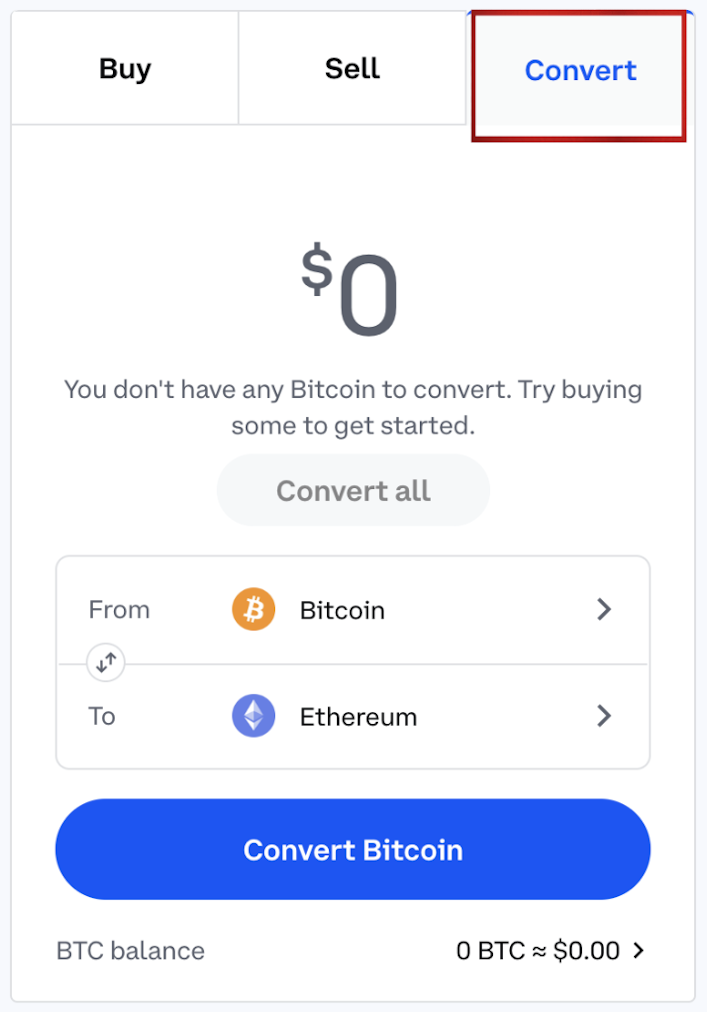
Step 2: Set up a Bitcoin Address of Your Own
Time to get your Bitcoin off Coinbase. First, you need to set up a Bitcoin address to receive those funds.
If you’re not familiar with what this means, don’t worry!
All it means is that you’ll create your own unhackable bank vault on the Bitcoin network with the click of a button — that’s really what a Bitcoin address is, a digital bank vault. As with any bank vault, what’s essential is securely storing the key that goes with it.
That’s here you have a choice:
Hold in a self-custody option with total control or…
An affordable collaborative custody provider to help you set up and secure your Bitcoin address.
Whichever direction you choose, there are 1000's of companies serving Bitcoiners, making it easier than ever to take the next step toward self-sovereignty.
Once you have a Bitcoin address set up and have securely stored your private keys, you’re almost ready to withdraw your Bitcoin from Coinbase and send it to your new Bitcoin address. But not just yet!
If you withdraw your Bitcoin by clicking 'Send' on your Bitcoin balance page and entering your new Bitcoin address, that withdrawal will leave a tiny amount of Bitcoin behind, known as “dust.”
When you try to close your account, Coinbase won’t let you if you have a non-zero balance due to network transaction costs.
To avoid this frustrating situation, you must wait to withdraw your Bitcoin as part of the account closure process in Step 3.
Step 3: Withdraw from Coinbase and Delete Your Coinbase Account
It’s no surprise Coinbase doesn’t readily tell you how to delete your Coinbase account… But, closing your Coinbase account and transferring your Bitcoin to your new address is easy.
Below is the step-by-step process laid out screen by screen…
1. Log into your Coinbase account on a desktop browser:
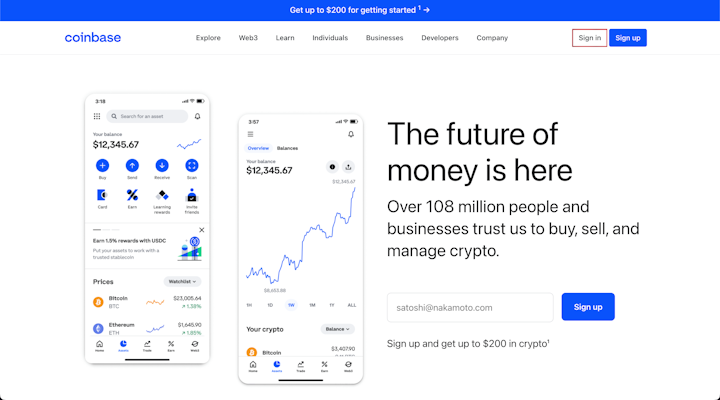
2. Navigate to your user Settings and Activity tab with three clicks. First, click your profile circle in the upper right-hand corner:
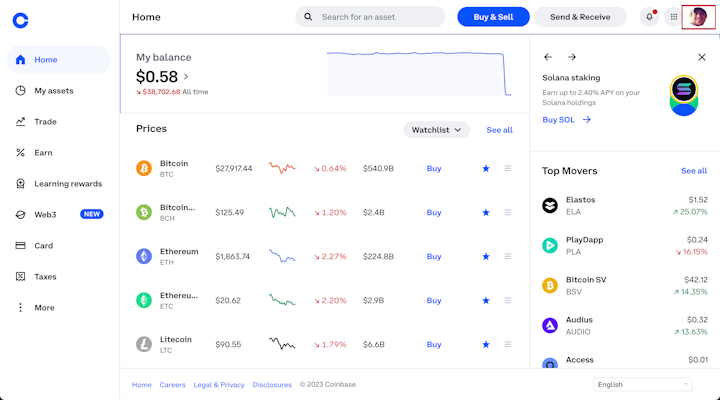
3. Next, select 'Settings' from the drop-down box window.:
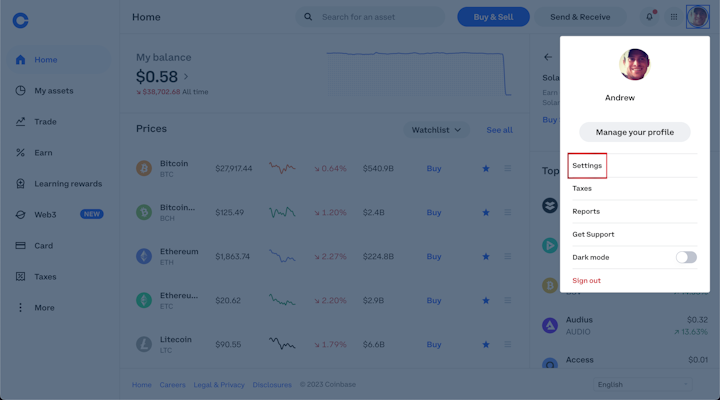
4. Find the Activity tab:
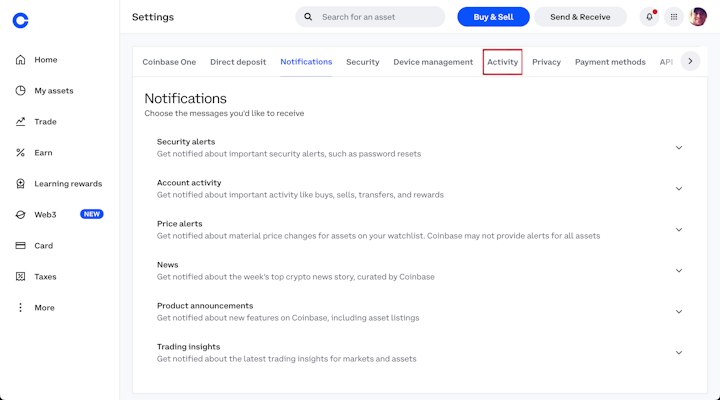
5. Scroll down to the bottom of the Activity tab and click 'Close Account.'

6. Enter your account password in the pop-up box, and click 'Close Account.'
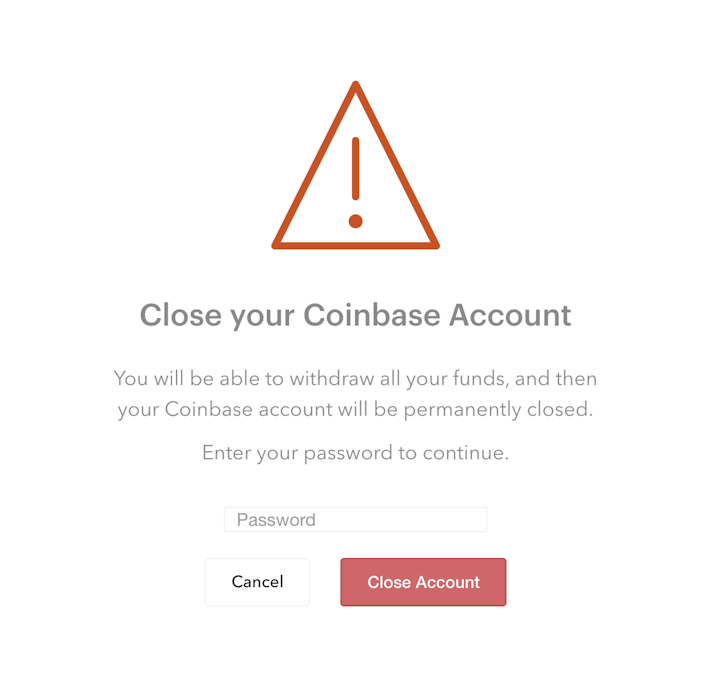
7. You will be prompted to withdraw your Bitcoin balance from Coinbase as part of the account closure process.
8. You will be presented with a page that shows every possible digit asset on Coinbase.
With everything zeroed out, scroll to the bottom and click 'Close Account' in the bottom right-hand corner:
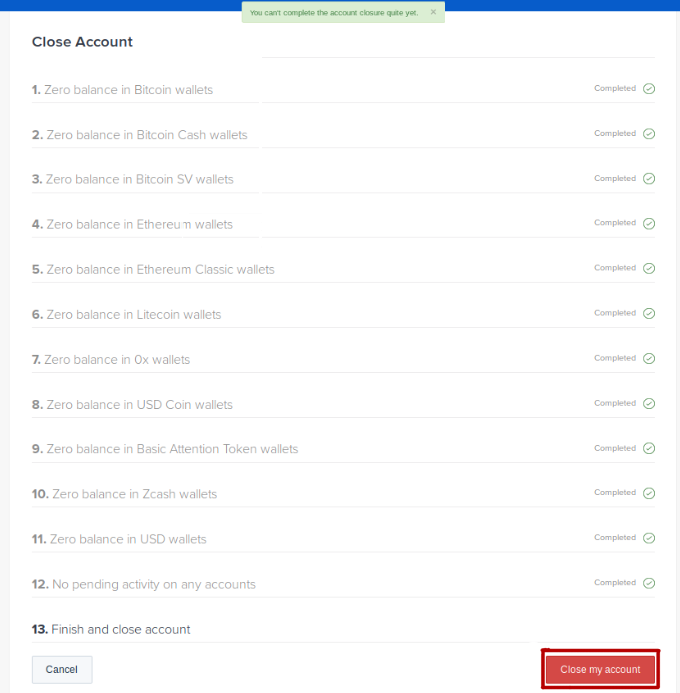
Why does the #DeleteCoinbase movement continue to grow?
Top three reasons:
Bitcoin already has an insurmountable lead on all other cryptocurrencies in terms of market cap, liquidity, brand recognition, and total users. In the coming years and decades, Bitcoin will likely accrue 90 — 99% of all the future value in the digital asset space.
Coinbase does not want you to accumulate and hold Bitcoin. Every aspect of Coinbase’s product and marketing is designed to encourage you to trade as many assets as possible as often as possible. Coinbase makes money when you trade like any other casino, hoping to keep gamblers on the casino floor.
96% of traders fail. Unless you’re a career professional, the sophisticated algorithm-aided pros who dominate the space will eat your lunch. You wouldn’t sit at a table with the best poker players in the world; trading is the same thing.
You are best served by simply buying and holding Bitcoin in cold storage or a Swan Bitcoin IRA.
This regulatory uncertainty surrounding Coinbase raises concerns leading to a loss of customer trust and confidence in the platform.
If Coinbase cannot demonstrate it is not engaged in selling unregistered securities, the consequences can include:
A cease and desist order
Financial penalties
Legal proceedings
Additional operational restrictions imposed by regulatory authorities
When closing a Coinbase account, the following actions are typically taken:
Withdrawal of Funds: Ensure all funds and cryptocurrencies are withdrawn or transferred from your Coinbase account. Sell or transfer holdings to an external wallet or another exchange.
Account Deactivation: Closing your account means losing access to it. You won’t be able to log in or perform any account-related actions. Coinbase may retain your account information as required by law or for other legitimate purposes.
Termination of Services: Closing your Coinbase account terminates your relationship with them and their associated services, including buying, selling, or trading cryptocurrencies on their platform. You’ll lose access to features, tools, and customer support.
Reopening Limitations: Closed accounts may not be reopened. If you for some reason wish to use Coinbase again, you’ll need to create a new account and go through the registration process anew.
Data Retention: Coinbase may retain certain information related to your closed account, including transaction records, ccount activity, dentification details for compliance and legal obligations.
Is Coinbase even safe?
The recurring purchases feature allows you to consistently invest in Bitcoin effortlessly, empowering you to build your digital wealth over time.
Moreover, Swan has the option to self-custody your Bitcoin, ensuring greater control and security over your Bitcoin. While self-custody is recommended, its optional and Swan accommodates a diverse range of user preferences.
Swan has best in class customer service, ensuring a seamless and informed experience throughout your Bitcoin journey.
Coinbase fares no better with the Better Business Bureau. The exchange has a near-worst possible score of 1.06 stars of 5-star rating.
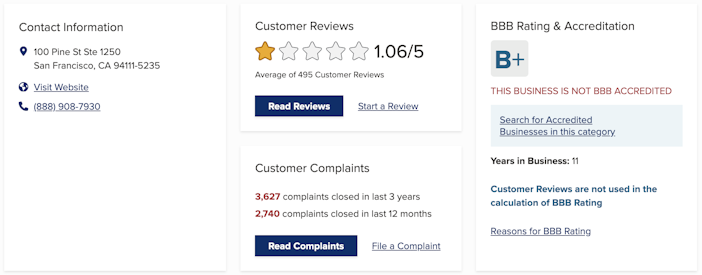
Furthermore, the following ⚠️ CURRENT ALERTS FOR THIS BUSINESS message can be found on the company BBB page:
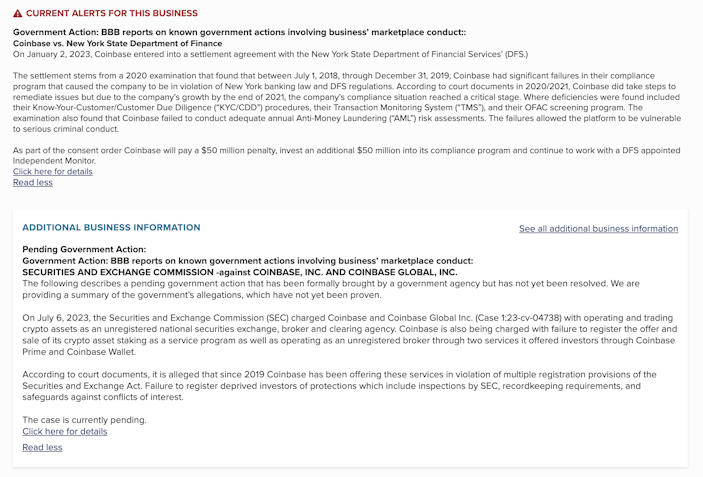
If you’re outside the United States, our “Bitcoin Investment Sites for 2024: Top 6 Trusted Sites” article has you covered!
Become a Swan and get started today!
Sign up to start saving Bitcoin
Buy automatically every day, week, or month, starting with as little as $10.
Cory Klippsten is the CEO of Bitcoin financial services firm Swan.com. He is a partner in Bitcoiner Ventures and El Zonte Capital, serves as an advisor to The Bitcoin Venture Fund, and as an angel has funded more than 50 early stage tech companies. Before startups, Klippsten worked for Google, McKinsey, Microsoft and Morgan Stanley, and earned an MBA from the University of Chicago. He grew up in Seattle, split 15 years between NYC and Chicago, and now lives in LA with his wife and daughters. His hobbies include basketball, history and travel (Istanbul and Barcelona are favorites).
More from Swan Signal Blog
Thoughts on Bitcoin from the Swan team and friends.
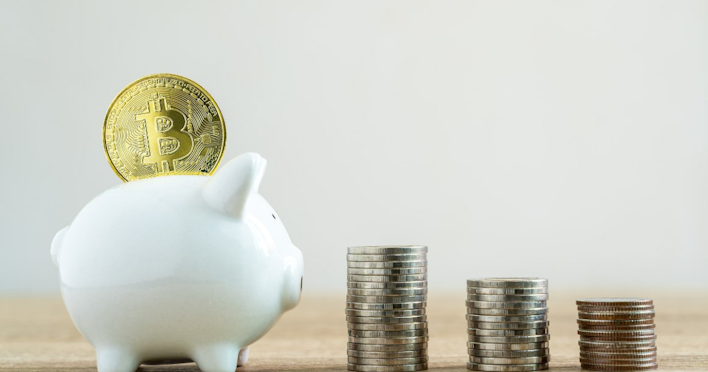
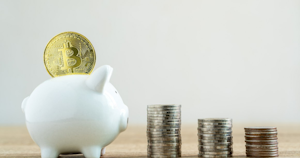
Best 6 Bitcoin & Crypto IRAs for 2024: Which Wins?

By Drew
Bitcoin IRAs have exploded in popularity. This guide breaks down the most popular Bitcoin IRAs and Crypto IRAs of 2024 and will help you pick the best one for your goals and situation.
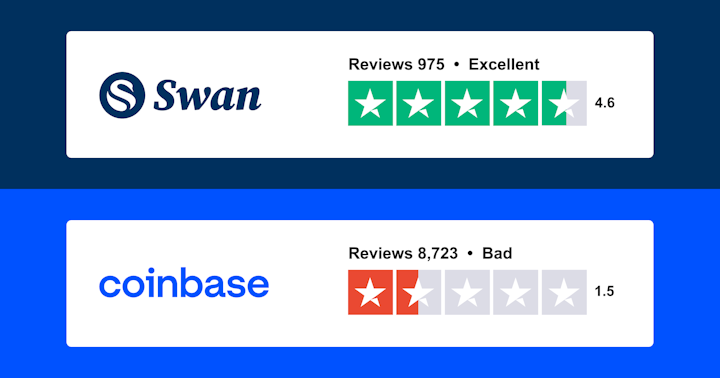
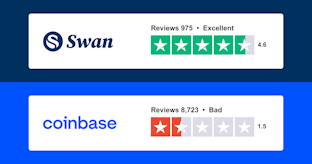
7 Best Coinbase Alternatives 2024 (What You Need to Know)

By Drew
The uncertainty surrounding compliance and regulatory problems for Coinbase is intensifying. Bitcoin-only Swan is one of the most popular Coinbase alternatives for buying Bitcoin in 2024. Here is why!






